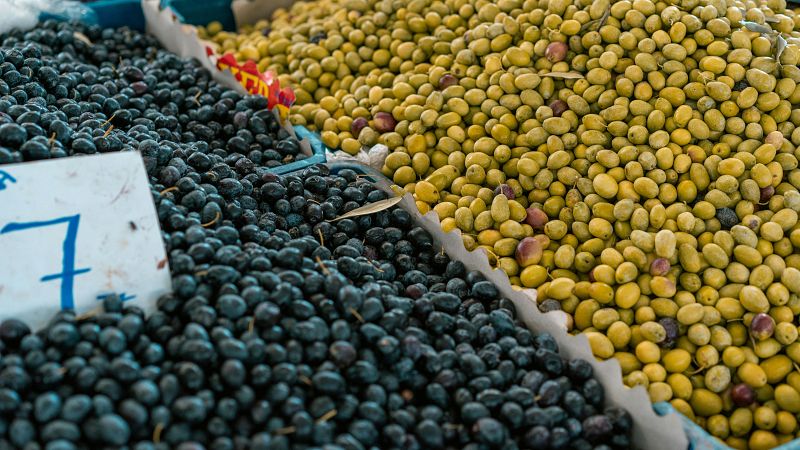EU targets US with tariff list for Trump-era olive trade dispute

The European Commission is preparing a list of US products to target for retaliatory import tariffs in an ongoing trade spat over Spanish black olives, a spokesperson has confirmed to Euronews.
The spat originated in tariffs slapped on Spanish olives during Donald Trump's first tenure at the White House in 2017 and now looks set to be an early issue affecting EU-US relations as he resumes tenure as US president next year.
In 2017 the US imposed anti-subsidy and anti-dumping duties of 30% to 44% on imports of Spanish black olives, claiming domestic producers were being harmed by EU subsidies provided to Spanish olive producers under the Common Agricultural Policy (CAP).
The EU challenged the measures at the World Trade Organisation (WTO), leading to a legal battle spanning over four years and formally concluded in November 2021, when a first panel ruled that the US administration's actions were in breach of WTO rules.
Despite resolution of the initial case, the European Commission claimed the US failed to address the WTO's recommendations, and last Friday (15 November filed a request with the WTO's Dispute Settlement Body (DSB) for the authorisation of retaliatory tariffs.
The WTO is expected to discuss and approve it during a meeting next Monday (25 November).
“This would allow the EU to impose import tariffs on US products in order to offset the negative economic effects of the illegal US tariffs, until the US complies with the WTO ruling on this matter,” the Commission spokesperson told Euronews.
The EU is currently finalising a list of specific products to be targeted by its countermeasures, the spokesperson continued.
The general principle at the WTO level is that the complaining party should first seek to hit products in the same sector as those subject to illegal duties.
If that is not practicable or effective, it is possible to take countermeasures on products in other sectors or covered by other WTO agreements.
“It doesn’t have to be on agriculture,” former Commission senior official John Clarke told Euronews.
“The default rule is goods for goods, meaning that the Commission will identify some US goods exports with the value of 35 million,” said Clarke, previously led the EU delegation to the WTO.
Tariff lines and retaliation lists are extremely confidential, a “closely-guarded secret” Clarke said, noting that in the past the Commission strategically targeted products such as Bourbon and Harley-Davidson motorbikes, produced in strongholds of the US Republican party.
The US remains the largest market for Spanish olives, accounting for approximately 35% of total exports.
These new developments come amid broader concerns about trade relations, as former President Donald Trump has recently floated plans to impose blanket tariffs of up to 20% on European imports, reigniting fears of a transatlantic trade war.
Any escalation could have broader implications, particularly as Trump’s renewed trade policies threaten to put key European markets, including Spain, at risk.
“We regret that the US has not complied and that diplomatic efforts have not resulted in the elimination of the tariffs imposed on Spanish producers since 2018,” a spokesperson for EU farmers lobby Copa Cogeca told Euronews.
According to the group, Spanish olive producers have spent €17 million on legal fees and have lost almost €300 million in exports to the US since the tariffs were imposed.
The spokesperson said they support the Commission’s action as it sends a clear message to third-country partners that CAP support is in line with relevant WTO rules and that the Commission will act to defend it.
Today

